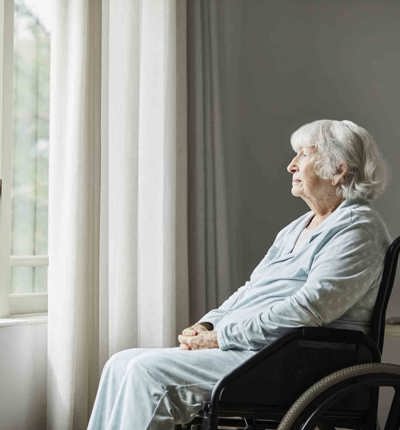
Vital messaging inaccessible to many throughout the pandemic
Kate Egerton considers the failure of public bodies and service providers to make communications properly available to people with disabilities and those without access to the internet.
Posted on 17 November 2020
The COVID-19 virus is presenting us with an unprecedented public health challenge and never has information about how to protect ourselves and others been more important. However, for people with certain disabilities and the elderly accessing this information has been hugely problematic.
Public bodies and service providers have a duty under the Equality Act 2010 to ensure their communications are accessible to people with disabilities, and that people with protected characteristics (including age, disability and race) are not put at a disadvantage by the way information is provided.
The Accessible Information Standard also requires health and social care providers to set up a system to identify, record, and flag individuals’ communication needs so that an individual need only notify them once of their preferred format.
However, we are receiving multiple reports that these legal duties have not been complied with in the government’s response to the COVID-19 pandemic.
Individuals, some of whom have become clients, tell us that they feel marginalised and isolated as a result, and distressed that they are unable to access critical information to protect them from the virus.
By way of example, the government sent out written correspondence at the beginning of lockdown setting out the rules which the public were required to abide by and the consequences (including being subject to fines) should they not.
This correspondence was inaccessible for people with visual impairments unable to read the correspondence, and the government has refused to send out correspondence in people’s preferred formats. The government also continues to send important information to people who are shielding in a manner they cannot access.
The government’s answer is to say that everything is available online via their website and through social media channels, such as Twitter.
However, not everyone has access to the internet – in particular, the elderly who are also the most vulnerable to the virus. Also, for people who have lost their jobs because of the crisis, regular and ongoing access to the internet may simply be something they can no longer afford.
Local authorities are also sending out correspondence regarding adult social care to visually impaired service users in hard copy format, in breach of their legal duties. We have seen examples of services users repeatedly informing their local authority of their accessibility requirements, but still receiving information regarding their entitlement to adult social care inaccessibly.
Medical providers are also caught by the Equality Act 2010 and the Accessible Information Standard. Again sadly, it appears that compliance is variable and that patients continue to receive letters regarding appointments with no adjustments to make them accessible to the recipient.
This causes a huge amount of anxiety for people who don’t know whether routine appointments are going ahead, or whether procedures that have been delayed given the COVID crisis have been rescheduled without them knowing. They are placed in the dark by these failures to make adjustments.
It is true that some changes to technology that have been brought about as a result of the pandemic, such as the increased reliance on telephone appointments by medical practitioners, are beneficial to many patients and provide accessibility where previously it was lacking.
However, there should not be a piecemeal approach to these statutory duties and in making new arrangements consideration must be given to impact on others, such as increased barriers for Deaf people.
A final example of what appears to be widespread discrimination, is that many providers of services – from pubs to swimming pools – have moved to online booking systems.
While this may be convenient for many people, it has the potential to create a digital divide between internet and non-internet users, and further isolate people. This is likely to have a disproportionate impact on people with protected characteristics such as the elderly and those with disabilities.
Anyone facing these issues should seek legal advice. Legal aid may be available to those who are financially eligible.
Public bodies and service providers have a duty under the Equality Act 2010 to ensure their communications are accessible to people with disabilities, and that people with protected characteristics (including age, disability and race) are not put at a disadvantage by the way information is provided.
The Accessible Information Standard also requires health and social care providers to set up a system to identify, record, and flag individuals’ communication needs so that an individual need only notify them once of their preferred format.
However, we are receiving multiple reports that these legal duties have not been complied with in the government’s response to the COVID-19 pandemic.
Individuals, some of whom have become clients, tell us that they feel marginalised and isolated as a result, and distressed that they are unable to access critical information to protect them from the virus.
By way of example, the government sent out written correspondence at the beginning of lockdown setting out the rules which the public were required to abide by and the consequences (including being subject to fines) should they not.
This correspondence was inaccessible for people with visual impairments unable to read the correspondence, and the government has refused to send out correspondence in people’s preferred formats. The government also continues to send important information to people who are shielding in a manner they cannot access.
The government’s answer is to say that everything is available online via their website and through social media channels, such as Twitter.
However, not everyone has access to the internet – in particular, the elderly who are also the most vulnerable to the virus. Also, for people who have lost their jobs because of the crisis, regular and ongoing access to the internet may simply be something they can no longer afford.
Local authorities are also sending out correspondence regarding adult social care to visually impaired service users in hard copy format, in breach of their legal duties. We have seen examples of services users repeatedly informing their local authority of their accessibility requirements, but still receiving information regarding their entitlement to adult social care inaccessibly.
Medical providers are also caught by the Equality Act 2010 and the Accessible Information Standard. Again sadly, it appears that compliance is variable and that patients continue to receive letters regarding appointments with no adjustments to make them accessible to the recipient.
This causes a huge amount of anxiety for people who don’t know whether routine appointments are going ahead, or whether procedures that have been delayed given the COVID crisis have been rescheduled without them knowing. They are placed in the dark by these failures to make adjustments.
It is true that some changes to technology that have been brought about as a result of the pandemic, such as the increased reliance on telephone appointments by medical practitioners, are beneficial to many patients and provide accessibility where previously it was lacking.
However, there should not be a piecemeal approach to these statutory duties and in making new arrangements consideration must be given to impact on others, such as increased barriers for Deaf people.
A final example of what appears to be widespread discrimination, is that many providers of services – from pubs to swimming pools – have moved to online booking systems.
While this may be convenient for many people, it has the potential to create a digital divide between internet and non-internet users, and further isolate people. This is likely to have a disproportionate impact on people with protected characteristics such as the elderly and those with disabilities.
Anyone facing these issues should seek legal advice. Legal aid may be available to those who are financially eligible.


